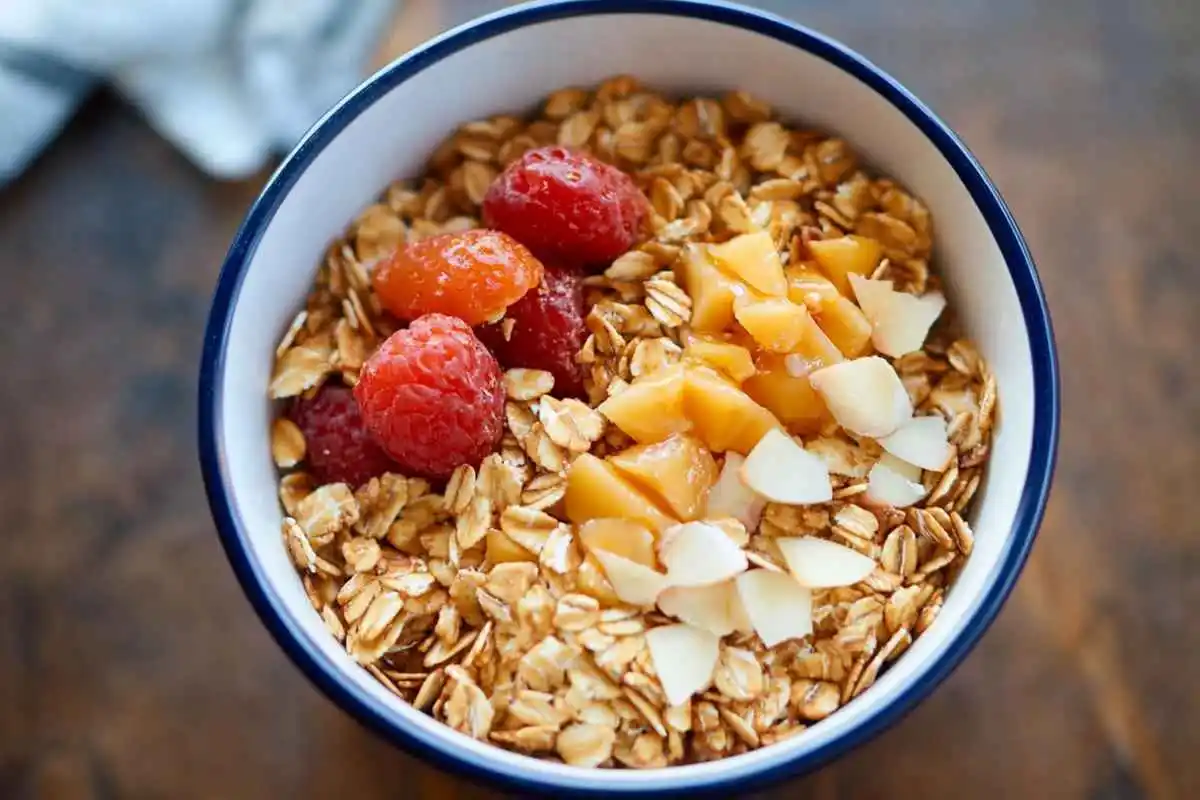Struggling to find a breakfast that’s both delicious and aligns with your health goals? A macro friendly breakfast is here to change that!
Whether you’re aiming to lose weight, build muscle, or simply maintain a balanced diet, starting your day with the right mix of macronutrients—protein, carbs, and fats—can make all the difference.
This guide to macro friendly breakfasts is designed to take the guesswork out of meal planning.
From hearty egg dishes to quick smoothies, these ideas will help you stay on track without sacrificing flavor or convenience.
Plus, balancing your macros in the morning can keep you energized, satisfied, and ready to conquer the day.
Don’t worry if you’re not a morning person or prefer grab-and-go options—there’s something here for everyone!
Let’s dive into easy, nutritious recipes and tips to make macro-friendly breakfasts a seamless part of your routine.
What Are Macros and Why Are They Important for Breakfast?

If you’ve ever heard fitness experts or nutritionists talk about “counting macros,” you might be wondering what they mean.
Macronutrients, commonly known as macros, include protein, carbohydrates, and fats—three essential nutrients your body requires in significant amounts for optimal function.
Each macro plays a crucial role in your overall health and energy levels, especially when it comes to starting your day with breakfast.
The Role of Macronutrients
Protein:
- Your body needs protein to support muscle growth and repair, as well as to maintain healthy tissues.. It also helps keep you feeling full for longer, which can reduce mid-morning hunger pangs.
- Foods rich in protein include eggs, Greek yogurt, lean meats, tofu, and protein powders.
Carbohydrates:
- Carbs are your body’s primary energy source, especially in the morning when you need a boost to kickstart your day. They fuel your brain and muscles, making them critical for physical and mental performance.
- Great breakfast carbs include oats, whole-grain bread, fruits, and sweet potatoes.
Fats:
- Healthy fats are vital for hormone production, brain health, and overall satiety. They also slow digestion, helping you feel satisfied for longer.
- Look for fats like avocado, nuts, seeds, and olive oil to round out your breakfast.
Why Balancing Macros Is Crucial for Breakfast
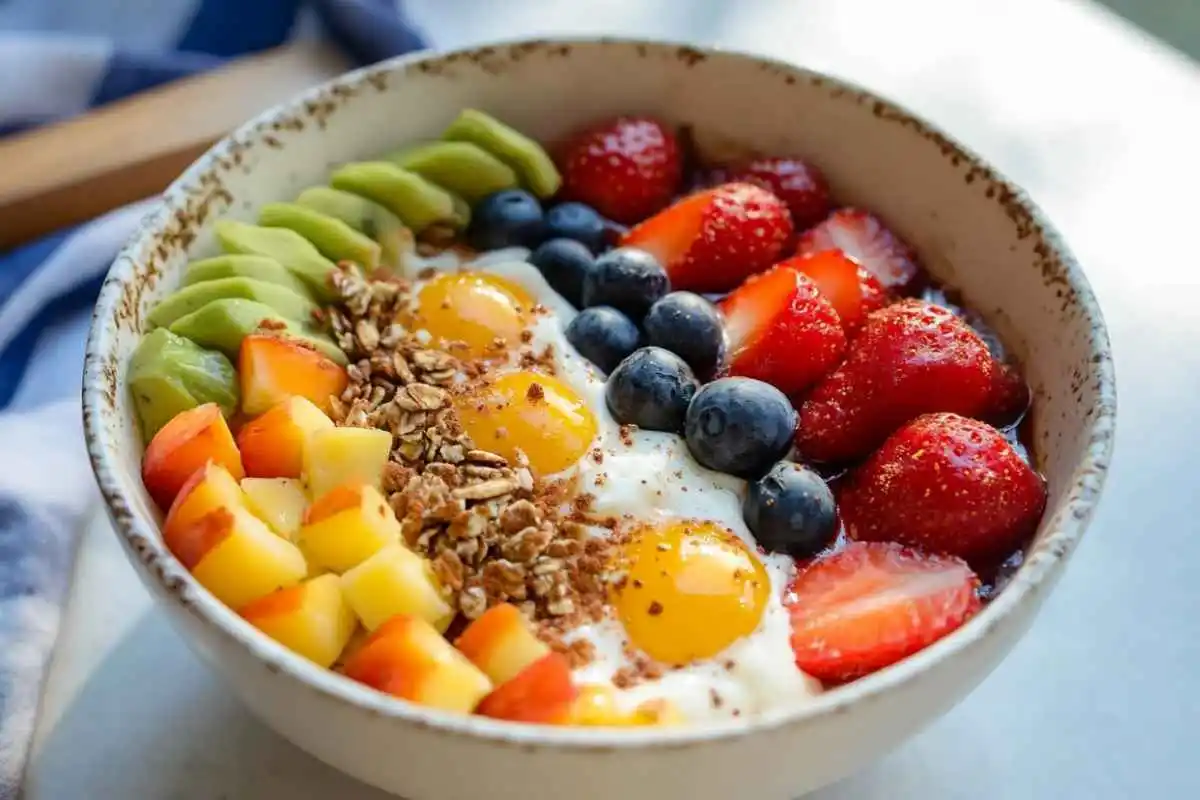
Many consider breakfast the most crucial meal of the day, as it provides essential nutrients and energy to kickstart your morning.. After fasting overnight, your body is craving nutrients to replenish energy stores and prepare for the day ahead.
A macro-balanced breakfast ensures:
- Sustained Energy Levels: Combining protein, carbs, and fats helps maintain steady blood sugar levels, avoiding energy crashes.
- Better Focus: A balanced breakfast fuels your brain, improving mental clarity and productivity.
- Support for Fitness Goals: Whether you’re trying to lose weight, gain muscle, or maintain a healthy lifestyle, a well-rounded breakfast aligns with your nutritional needs.
Examples of Macro Ratios for Different Goals
Your ideal macro ratio may vary depending on your personal goals and activity levels. Here are a few examples:
For Weight Loss:
- Higher protein intake to preserve muscle mass and stay full longer.
- Suggested ratio: 40% protein, 30% carbs, 30% fats.
- Example breakfast: Scrambled eggs with spinach and avocado, served with a side of mixed berries.
For Muscle Gain:
- Increased carbs to fuel workouts and aid in muscle recovery.
- Suggested ratio: 30% protein, 50% carbs, 20% fats.
- Example breakfast: Protein pancakes topped with banana slices and a dollop of almond butter.
For Maintenance and Balanced Energy:
- Equal focus on all macros for overall health and wellness.
- Suggested ratio: 33% protein, 33% carbs, 33% fats.
- Example breakfast: Greek yogurt parfait with granola, chia seeds, and fresh fruit.
By understanding macros and tailoring your breakfast to your needs, you can start your day feeling energized, focused, and ready to take on the world.
Balancing macros doesn’t have to be complicated—it’s about finding the right foods and combinations that work for your lifestyle and goals.
10 Quick and Easy Macro Friendly Breakfast Ideas
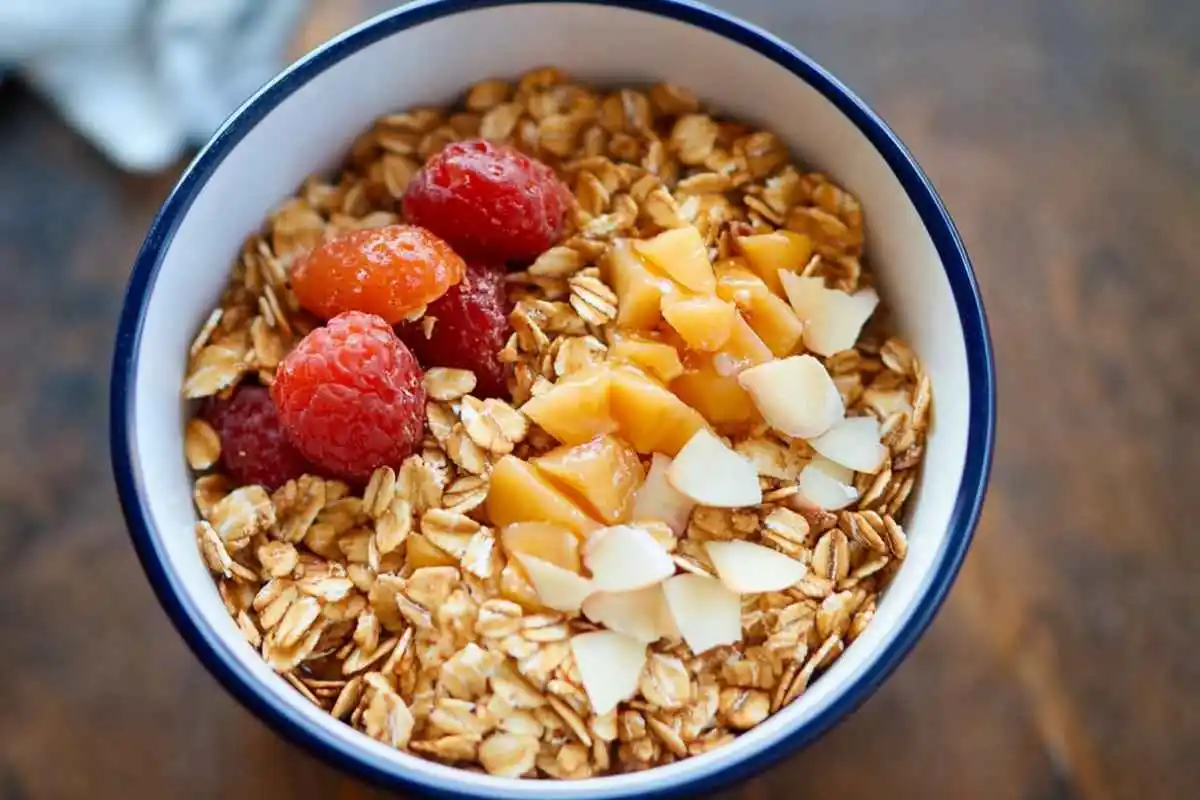
Mornings can be hectic, but that doesn’t mean you have to sacrifice nutrition or flavor. These macro friendly breakfast ideas are quick, easy to prepare, and balanced to provide the right mix of protein, carbs, and healthy fats.
Whether you’re a meal prepper, a grab-and-go person, or someone who loves to sit down for breakfast, there’s something here for everyone.
1. Greek Yogurt Parfait with Berries and Granola
Layers of creamy Greek yogurt, sweet berries, and crunchy granola make for a delicious and satisfying breakfast.
- Why It’s Macro-Friendly: Greek yogurt is rich in protein, berries provide natural carbs and antioxidants, and granola adds healthy fats from nuts or seeds.
- Example Macros: Protein: 20g | Carbs: 35g | Fats: 8g
Pro Tip: Swap the granola for crushed almonds or chia seeds to lower the sugar content.
2. Protein Pancakes with Nut Butter
- Why It’s Macro-Friendly: Protein pancakes provide a great protein-to-carb balance, and a drizzle of nut butter adds healthy fats for satiety.
- Example Macros: Protein: 25g | Carbs: 30g | Fats: 12g
Pro Tip: Add a handful of blueberries or a sprinkle of cinnamon for extra flavor and antioxidants.
3. Avocado Toast with Eggs
A trendy yet timeless option, avocado toast with eggs is simple, satisfying, and packed with nutrients.
- Why It’s Macro-Friendly: Whole-grain toast offers fiber-rich carbs, eggs bring protein and healthy fats, and avocado adds creaminess with heart-healthy monounsaturated fats.
- Example Macros: Protein: 18g | Carbs: 25g | Fats: 15g
Pro Tip: Sprinkle red chili flakes or everything bagel seasoning for added zest
4. Breakfast Smoothie with Protein Powder
For those who need breakfast on the go, a smoothie is the perfect solution. Blend your favorite fruits, protein powder, and almond milk for a quick and refreshing start to the day.
- Why It’s Macro-Friendly: A well-balanced smoothie combines protein, carbs, and fats in one easy-to-drink meal.
- Example Macros: Protein: 30g | Carbs: 35g | Fats: 10g
Pro Tip: Add spinach or kale for a nutrient boost without altering the flavor.
5. Overnight Oats with Chia Seeds
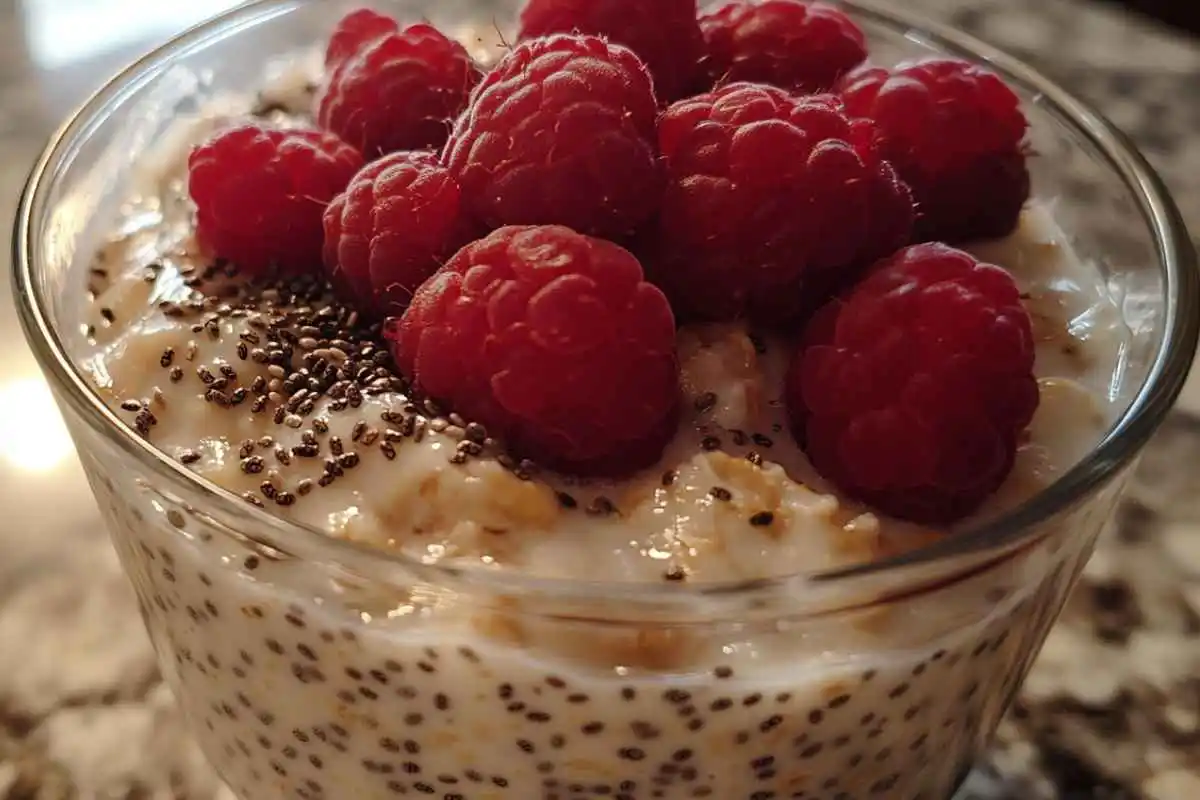
Overnight oats are a lifesaver for busy mornings, as they require zero prep time in the AM.
- Why It’s Macro-Friendly: Oats are an excellent source of slow-digesting carbs, while chia seeds and almond milk provide healthy fats and protein.
- Example Macros: Protein: 20g | Carbs: 40g | Fats: 10g
Pro Tip: Customize with toppings like fresh berries, nuts, or a drizzle of honey.
6. Scrambled Eggs with Spinach and Sweet Potatoes
This savory combination is perfect for those who prefer a hearty breakfast.
- Why It’s Macro-Friendly: Eggs deliver protein and fats, while sweet potatoes offer complex carbs to keep you energized. Spinach adds fiber and essential vitamins.
- Example Macros: Protein: 22g | Carbs: 28g | Fats: 1
Pro Tip: Sprinkle with feta cheese or nutritional yeast for added flavor.
7. Avocado and Egg Wraps
A handheld breakfast option that’s both filling and portable.
- Why It’s Macro-Friendly: Avocado provides heart-healthy fats, and pairing it with eggs in a whole-grain tortilla creates a balanced, flavorful meal.
- Pro Tip: Add sautéed veggies like peppers or onions for extra nutrients.
- Example Macros: Protein: 20g | Carbs: 30g | Fats: 12g
8. Cottage Cheese with Fresh Fruit
For a light yet protein-packed breakfast, cottage cheese paired with fruit is a winning choice.
- Why It’s Macro-Friendly: Cottage cheese is low in carbs and high in protein, while fresh fruit adds natural sweetness and essential nutrients.
- Pro Tip: Sprinkle with cinnamon or crushed walnuts for an added flavor kick.
- Example Macros: Protein: 20g | Carbs: 20g | Fats: 5g
9. Tofu Scramble with Veggies
A plant-based alternative to scrambled eggs, tofu scramble is equally filling and flavorful.
- Why It’s Macro-Friendly: Tofu is high in protein, and when paired with sautéed vegetables, it provides a balanced mix of macros.
- Pro Tip: Season with turmeric, garlic powder, and a pinch of nutritional yeast for a cheesy flavor.
- Example Macros: Protein: 20g | Carbs: 25g | Fats: 8g
10. Almond Butter and Banana Rice Cakes
For a quick and simple breakfast, rice cakes topped with almond butter and banana slices are a go-to.
- Why It’s Macro-Friendly: Rice cakes provide quick-digesting carbs, almond butter offers healthy fats, and bananas add a touch of natural sweetness.
- Example Macros: Protein: 8g | Carbs: 35g | Fats: 12g
Pro Tip: Sprinkle chia or hemp seeds on top for a nutrient boost
These ideas prove that macro friendly breakfasts can be both nutritious and delicious, without requiring hours in the kitchen. Start your mornings with one of these options, and you’ll feel energized, satisfied, and ready to tackle the day ahead.
Meal Prep Strategies for Macro Friendly Breakfasts

Meal prepping is a game-changer for those who want to stick to their macro goals without the stress of figuring out breakfast every morning. A little planning and preparation can save you time, money, and effort while ensuring that your mornings are both nutritious and efficient. Here’s how to master meal prepping for macro-friendly breakfasts:
Why Meal Prep for Breakfast?
- Time-Saving: Prepping your breakfast ahead of time eliminates the morning rush. You’ll have grab-and-go options ready to eat.
- Consistency: Sticking to your macros is easier when your meals are pre-portioned and planned.
- Cost-Effective: Preparing meals in bulk reduces food waste and saves money compared to buying breakfast on the go.
Steps for Effective Breakfast Meal Prep
Plan Your Recipes:
- Choose recipes that are easy to prepare in bulk and can be stored without losing quality.
- Examples: Egg muffins, overnight oats, or protein-packed smoothies.
Portion Your Meals:
- se containers to divide your breakfasts into individual servings. This ensures you’re meeting your macro goals without guessing.
Prep Ingredients in Advance:
- Chop vegetables, cook proteins, and portion out dry ingredients like oats or granola.
Store Properly:
- Use airtight containers to keep food fresh. Label containers with the date to ensure you’re eating items while they’re still at their best.
Reheat Strategically:
- For items like egg muffins or breakfast burritos, a quick microwave reheat works well. Smoothies can be prepped in freezer-safe bags and blended fresh.
Macro Friendly Meal Prep Breakfast Ideas
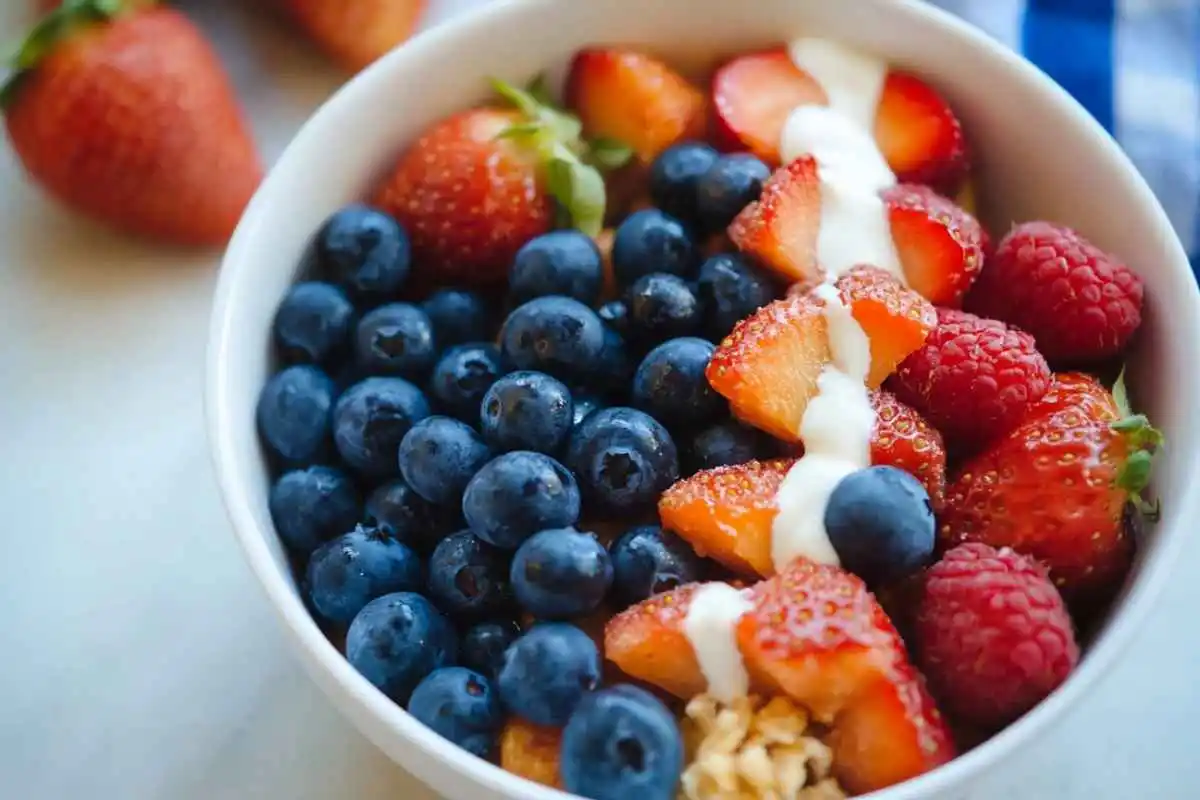
1. Egg Muffins with Veggies:
- Whisk together eggs, chopped spinach, diced peppers, and onions.
- Transfer the mixture into a muffin tin and bake until it firms up
- Keep refrigerated and consume within four days for freshness.
- Macros per muffin: Protein: 7g | Carbs: 2g | Fats: 4g
2. Overnight Oats:
- Mix oats, almond milk, chia seeds, and a scoop of protein powder in a jar to create a nutritious meal.
- Add toppings like fresh fruit or a drizzle of honey in the morning.
- Keep in the fridge for up to 3 days.
- Macros per serving: Protein: 20g | Carbs: 35g | Fats: 8g
3. Protein-Packed Breakfast Burritos:
- Scramble eggs or tofu with turkey sausage and black beans.
- Wrap in a whole-grain tortilla and freeze individually.
- Reheat in the microwave for a quick, hot breakfast.
- Macros per burrito: Protein: 25g | Carbs: 30g | Fats: 10g
4. Greek Yogurt Bowls:
- Pre-portion Greek yogurt into containers.
- Add granola and berries in separate compartments to maintain texture until serving.
5. Protein Smoothie Packs:
- Pre-measure protein powder, frozen fruits, and spinach into freezer bags.
- Blend with almond milk or water in the morning.
- Macros per smoothie: Protein: 30g | Carbs: 35g | Fats: 8g
Conclusion
Starting your day with a macro friendly breakfast is one of the easiest and most effective ways to fuel your body, support your fitness goals, and maintain steady energy levels throughout the day.
By balancing protein, carbs, and fats in your first meal, you set the tone for better focus, improved mood, and sustained satiety.
Whether you prefer quick grab-and-go options like protein smoothies or meal-prepped dishes like egg muffins and overnight oats, there’s no shortage of ways to make your mornings both nutritious and delicious.
Remember, macro-friendly doesn’t mean boring—it’s about finding creative and flavorful combinations that work for you.
Try out some of the ideas and recipes shared in this guide, and don’t hesitate to experiment with your own variations. A balanced breakfast isn’t just a meal; it’s a lifestyle choice that sets you up for success.
Ready to transform your mornings? Start incorporating macro-friendly breakfasts today and see the difference it makes in your energy, focus, and overall well-being.
Macro-Friendly Breakfast FAQs
What macros should I eat at breakfast?
The ideal macros for breakfast depend on your goals, but a balanced mix of protein, carbs, and fats is typically recommended. A good starting point is:
Protein: 20–30g to support muscle repair and satiety.
Carbs: 25–40g for energy.
Fats: 8–15g for satiety and sustained energy.
How do I get 30g of protein in breakfast?
To reach 30g of protein, try these combinations:
3 large eggs (18g) + ½ cup Greek yogurt (10g) + 1 tablespoon chia seeds (2g).
Protein shake made with 1 scoop protein powder (25g) + almond milk + spinach.
What are some effective ways to include 20 grams of protein in my breakfast?
You can easily hit 20g of protein with these options:
A serving of cottage cheese (15g) with a handful of almonds (5g).
2 scrambled eggs (12g) with smoked salmon (8g)
Should I avoid carbs for breakfast?
No, carbs are essential in the morning to provide quick energy. Focus on complex carbs like oats, whole-grain bread, or sweet potatoes for sustained energy without spikes in blood sugar.
What macros are best in the morning?
The best macros for breakfast depend on your goals:
Weight Loss: Higher protein and moderate carbs to keep you full longer.
Muscle Gain: Higher carbs to fuel workouts and aid in recovery.
General Health: Balanced macros (around 30% protein, 40% carbs, 30% fats).

